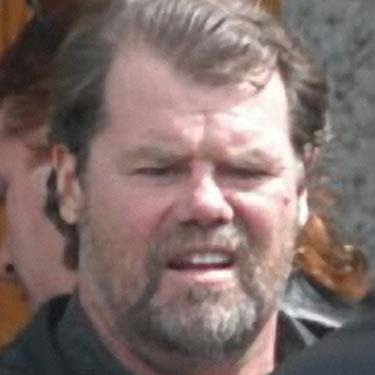Cedric Baxter Smith, 59, a full-patch member of the Vancouver Hells Angels, is missing and feared dead.
 Cedric Baxter Smith, 59, was one of the early members of the powerful biker gang, which is gathering in Langley this weekend to mark the 25th anniversary of its first chapters in B.C.
Cedric Baxter Smith, 59, was one of the early members of the powerful biker gang, which is gathering in Langley this weekend to mark the 25th anniversary of its first chapters in B.C.full-patch member of the Vancouver Hells Angels who unwittingly introduced a police informant to the organized crime group is missing and feared dead, The Vancouver Sun has learned.Smith was out on parole on a series of drug-trafficking convictions when he was last seen by his club brethren on the Victoria Day long weekend.
He failed to report to his probation officer June 17 and the next day, RCMP visited his Langley home in an unsuccessful bid to find him.
Police then heard from a senior Vancouver Hells Angels member on June 27 that Smith might have met with "foul play." RCMP located his abandoned vehicle in a Langley alley later that day.Insp. Gary Shinkaruk, who heads the RCMP's Outlaw Motorcycle Gang unit, confirmed that Smith has vanished without a trace."Cedric Smith of the Vancouver Chapter Hells Angels has been reported missing for some time now," Shinkaruk said. "We don't know where he is. We haven't found him yet."
Smith was the first Hells Angels member to have contact with a police agent who had already secretly agreed to infiltrate clubs in Vancouver and Prince George in a covert operation dubbed Project Essen.The investigation led to 10 major arrests in January 2005, including Smith and Vancouver club president Norman Krogstad. All the accused eventually pleaded guilty to various drug and gun charges, making the project the most successful prosecution of B.C. bikers to date.
Because of the guilty pleas, the police agent, who is now in the witness protection program, did not end up testifying.
Smith is not the only biker in the case who may have met with a violent end. Co-accused William (Billy) Moore, who headed the Hells Angels puppet club in Prince George, was slain in March 2005. The bullet-riddled body of the Renegades president was found slumped in his car near the charred remains of his rural home. The murder remains unsolved.Moore had extensive contact with the police agent during the 18-month undercover operation. Members of both the Angels and Renegades praised Moore at his funeral, held under the watchful eye of police.
At the time, Hells Angels spokesman Rickey Ciarniello, who owns the Vancouver chapter clubhouse, called Moore "a nice man" and said he was shocked at the murder.
Ciarniello refused to disclose Thursday if he had spoken to the RCMP about Smith's disappearance."I have nothing to say about that," Ciarniello said. "I am not going to say anything about it."At Smith and Krogstad's sentencing hearing, prosecutor Martha Devlin laid out the Crown case against the pair. She said the police agent began meeting Smith in June 2003 at his Langley home and was soon purchasing kilos of cocaine for $39,600 each. Some of the coke was delivered to a nearby Wendy's restaurant. The agent would leave the code 666 on Smith's pager as a signal to meet at the restaurant. Some of the coke was sold to the agent by Smith in Cache Creek and Boston Bar.At one point, when the police agent complained his kilogram was an ounce "short," Smith arranged a meeting with the agent and Krogstad, who was also charged with trafficking cocaine in Prince George with the Renegades and Moore.
When Smith was arrested, police found $73,000 at his house. In addition to a four-year sentence, Smith had to pay $100,000, but was allowed to use the seized cash towards the fine.His lawyer, David Martin, said at the time that Smith was single and had spent his entire life as an auto-body repairman.
Project Essen was the first major RCMP operation against the Hells Angels in B.C. and resulted in nine people convicted - four connected to the Vancouver chapter and the other five from the puppet Renegades.
Smith and Krogstad both got early parole in March 2007 due to their good behaviour.
But Smith was banned from associating with members of the biker gang until after the expiry of his warrant on Nov. 6, 2009, according to National Parole Board documents obtained by The Sun."There were no reasonable grounds to believe that, if released, you are likely to commit an offence involving violence before the expiry of your sentence," the parole board said.But board members also said Smith must recognize that his "association with people involved in criminal activity and criminal organizations was a causal factor in your criminal behaviour. You must therefore avoid any person you know or suspect is affiliated with an outlaw motorcycle gang or other organized criminal group."
"This condition is reasonable and necessary to protect society and to facilitate your successful reintegration as a law-abiding citizen," the board said.
The board noted that Smith's criminal record wasn't clear prior to the police sting that resulted in 11 charges against him.
"Though you have a number of convictions dating back to 1975 and 1993 that involved violent behaviour, the board is satisfied that you were a low risk for future violence," the parole documents said.Your affiliations with members of an outlaw motorcycle group and involvement in the drug trade were issues that had the potential of increasing your risk for violence. None of these have been in evidence since your day parole began
Ced's dead.
ReplyDelete